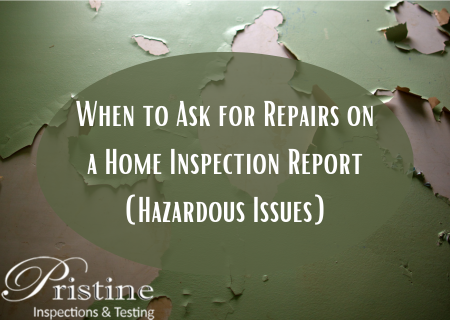A home inspection is an important step in the home buying process. It can help you identify any potential problems with the property before you buy it. However, not all problems are created equal. Some are more serious than others and may require immediate repairs.
If your home inspection report identifies any hazardous issues, it is important to ask the seller to make repairs before you close on the sale. Hazardous issues are those that could pose a threat to your health or safety. They can include:
- Lead-based paint: Lead-based paint is a serious health hazard, especially for young children. If your home was built before 1978, it is likely to contain lead-based paint. If the inspection report identifies lead-based paint, the seller must have it removed before you close on the sale.
- Asbestos: Asbestos is a naturally occurring mineral that can be found in insulation, roofing materials, and other building products. When asbestos fibers are released into the air, they can cause lung cancer and other respiratory problems. If the inspection report identifies asbestos, the seller must have it removed by a qualified professional.
- Termites: Termites are insects that can cause extensive damage to wood structures. If the inspection report identifies termites, the seller must have them treated before you close on the sale.
- Mold: Mold is a fungus that can grow in damp and humid conditions. It can cause allergic reactions and respiratory problems. If the inspection report identifies mold, the seller must have it removed by a qualified professional.
- Septic system: A septic system is a private sewage treatment system that is used in homes that are not connected to a municipal sewer system. Septic systems can fail and contaminate groundwater if they are not properly maintained. If the inspection report identifies problems with the septic system, the seller must have them repaired before you close on the sale.
- Faulty HVAC Systems – An HVAC system that is near or past its life expectancy, has mold growth, makes strange noises, or has difficulty maintaining a comfortable temperature needs repairs. A faulty HVAC system can be expensive to replace.
- Foundation Cracks and Settlement – Cracks in foundation walls, floors that slope, and doors or windows that no longer close properly are signs of foundation issues. These need to be evaluated and repaired to prevent further structural damage.
- Water Damage – Rotted wood, musty smells, and visible water stains are signs of water damage that can harbor mold, attract pests, and cause structural issues over time. Repairs are needed to prevent further deterioration.
- Gas Leaks – Gas leaks pose an explosion hazard and must be repaired immediately. Ask the seller to have the gas lines and appliances inspected and fixed by a professional.
In summary, any hazardous issues that pose risks to health, safety, or long-term structural integrity should be addressed before purchasing a home. Asking the seller to make necessary repairs based on the inspection report can help ensure you’re buying a home that is safe, sound, and ready for you to move in. Don’t hesitate to negotiate repairs for serious issues you uncover during the inspection process.
MORE INFORMATION:
- Is a Pre-Offer Inspection a Good Idea
- Mistakes to Avoid During Your Home Inspection
- How to Read and Decipher the Home Inspection Report
- 3 Factors Behind the Cost of Home Inspections
- Home Inspection Repair Requests Buyers Shouldn’t Make
- 9 Ways to Get the Most Out of Your Home Inspection
- 5 Home Inspection Mistakes People Make
- Additional: Are Home Inspections Necessary?

